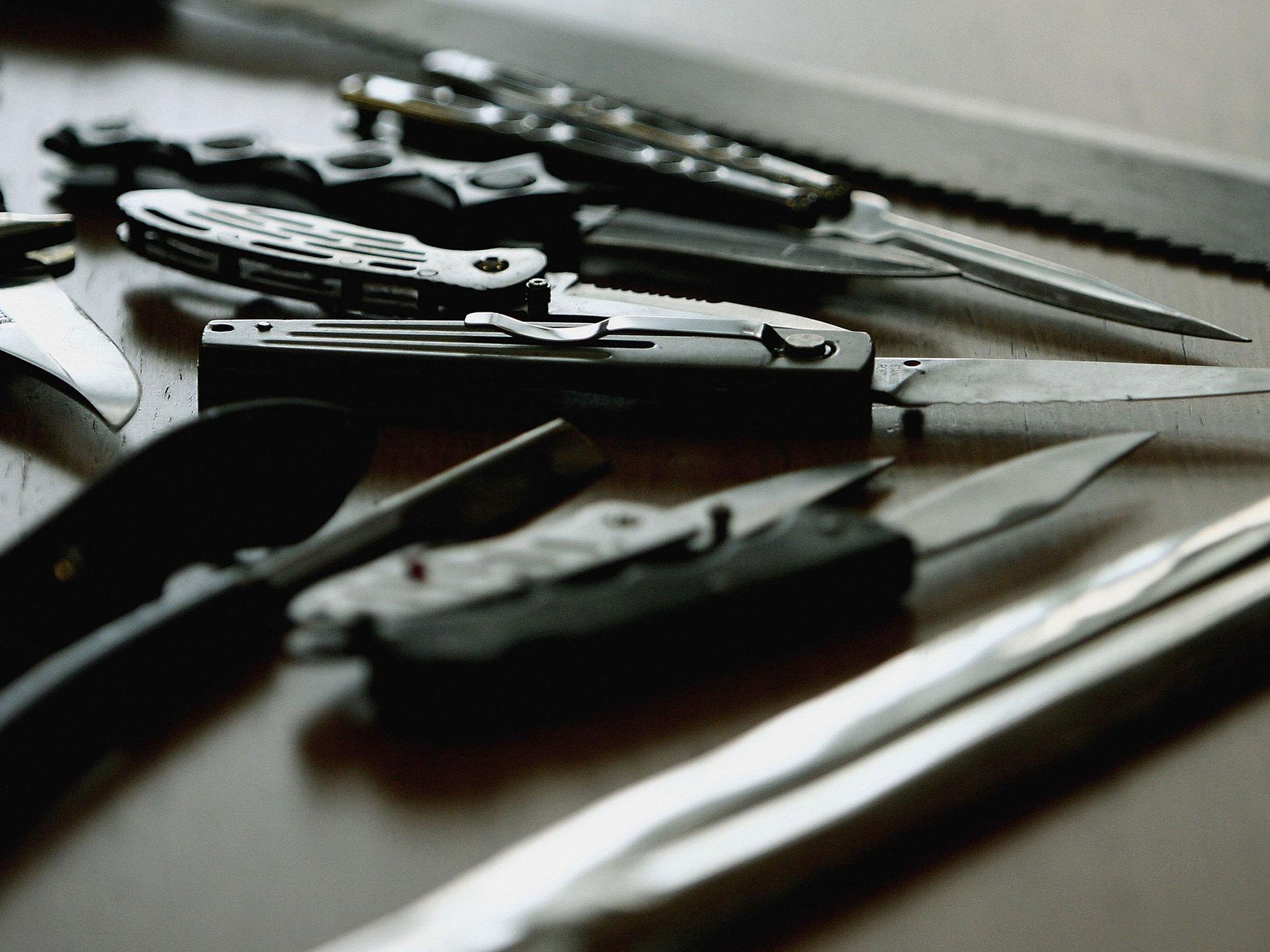Knife and weapon possession offences at highest level in eight years in England and Wales, new figures show
A fifth of offences are being committed by children, Ministry of Justice figures show

A fifth of the knife crime offences being punished in England and Wales are being committed by children, new figures have shown as offences stand at an eight-year high.
In the year to September, more than 21,300 knife and offensive weapon offences were dealt with by the criminal justice system, including around 4,500 committed by children as young as 10.
The majority were handed a community sentence by courts, such as unpaid work, but 558 were jailed and 1,300 were given formal warnings and cautions.
In the year to September, 13,477 offences of possessing an article with a blade or point resulted in a conviction or caution in England and Wales.
In addition, there were 6,946 cases where an individual was found with an offensive weapon and 958 where a knife or weapon was used to make threats against others.
Most of the children prosecuted had been found carrying a knife or dangerous weapon, amid a drive to increase stop and search to take them off the streets before fatal stabbings and fights.
Police have warned that children as young as nine are now carrying knives across the country, often in the belief it will protect them from growing violence.
Campaigners have blamed the Conservative government’s austerity for driving the phenomenon, citing cuts to youth services, mental health and policing following the loss of 20,000 officers since 2010.
On Thursday, the government was accused of “shunting the cost of policing” onto the general public after ministers called for a council tax increase to fund police.
Police say knife possession among children is also being driven by the rise of “county lines” gangs, which use teenagers to export drugs from urban to rural areas.
Mark Burns-Williamson, chair of the Association of Police and Crime Commissioners, said the problem was being exacerbated by school exclusions and the closure of youth centres and other services aimed at keeping teenagers off the streets.
“If we’re not careful, we’re building up a generation of young people who are going to be lost to the system,” he told The Independent last month.
“It is a real worry and we have to look at early intervention and prevention.
“The government has come very late in the day to this, we know we can’t just turn these things around overnight. It takes a lot of sustained work upstream to really make a difference.”
Gavin McKenna, a former gang member who now runs the Reach Every Generation group, said he was seeing children involved in gang culture and drug crime getting a lot younger.
“Often the most worrying and violent kids are 12 to 14,” he told The Independent. “There’s a whole generation getting taken out because nothing has been done to stop it.”
As part of its new Serious Violence Strategy, the government has started an Early Intervention Youth Fund to allocate £17.7m over the next two years to projects diverting children away from violent crime.
The home secretary, Sajid Javid, has also announced a consultation into a “public health approach” to tackle the issue and an independent review into drugs misuse.
Separate figures on the crimes recorded by police show knife crime at a record level, with almost 33,000 incidents in the year to June and 55 per cent resulting in a charge or caution.
The new Ministry of Justice figures showed that across all age groups, people are becoming more likely to be jailed for knife and offensive weapons crimes.
Prison sentences are at the highest level on record, with more than a third of crimes (7,789) resulting in imprisonment in the year to September, compared to 23 per cent a decade ago.
The jail terms handed out by judge, now at an average of eight months, are also getting longer and the proportion of offences resulting in a caution is at the lowest level ever, at 11 per cent.
Under a “two strikes” system introduced in 2015, minimum terms were introduced for those aged 16 and over who are convicted of a second or subsequent offence of possession of a knife or offensive weapon.
Courts must impose the minimum sentence unless it would not be “in the interests of justice” to do so.
Rory Stewart, the justice minister, said: “Knife crime has devastating consequences on families, children and communities – offenders simply cannot go unpunished.
“These figures show we are catching and prosecuting more of those carrying knives and other weapons, and sending them to prison for longer.
“But we must do more, and through the government’s Serious Violence Strategy we are working to prevent young people from ever picking up a knife in the first place.”
